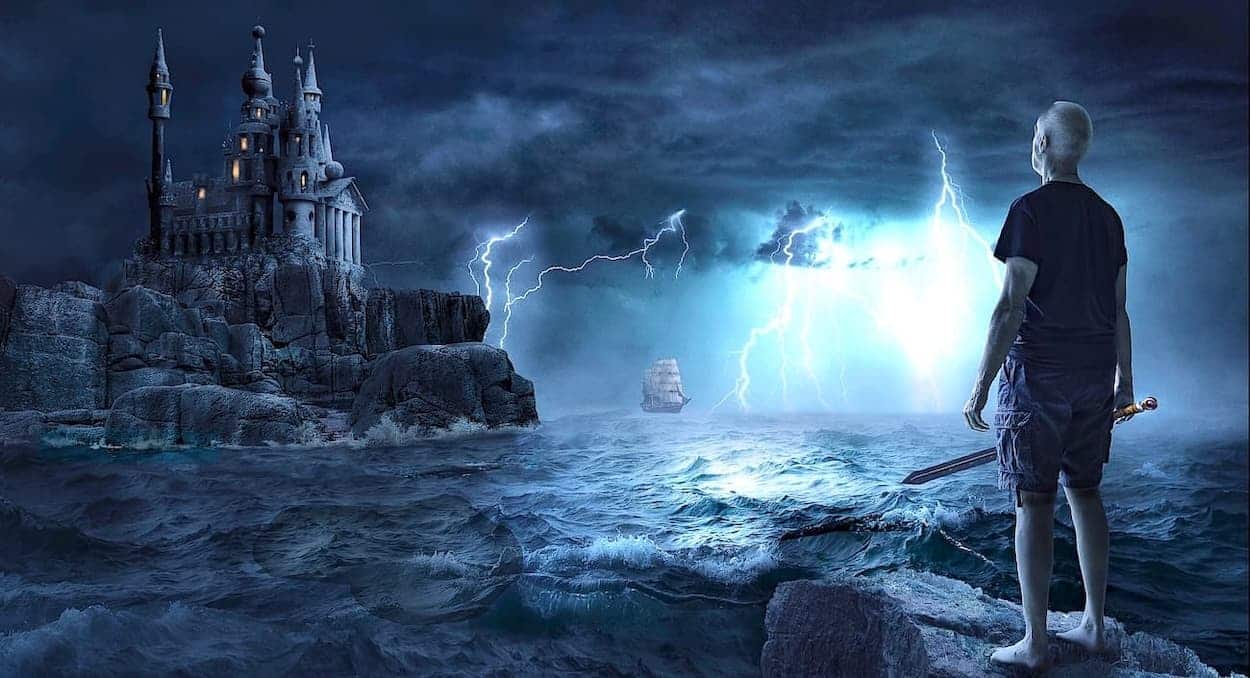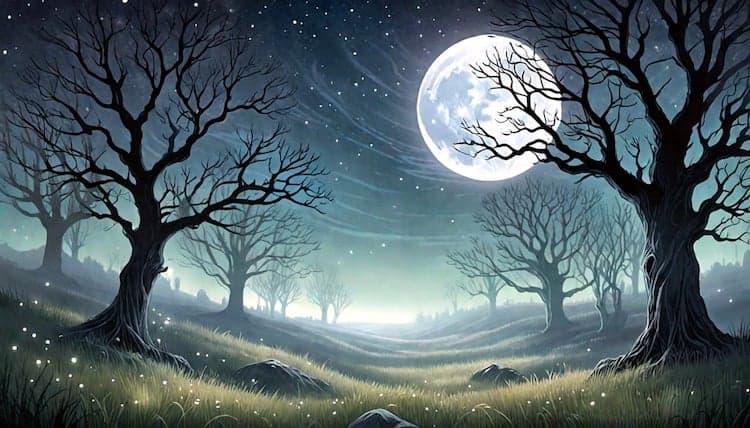
To describe a night vividly in writing, you must move beyond weak adjectives like “dark” or “quiet.” Instead, use a sensory noun phrase followed by a strong action verb to show the setting. Focus on elements like moonlight, shadows, or shifting temperatures to create an immersive, atmospheric scene for your reader.
When you describe a night in writing, you are setting the scene for your story or a new chapter. You want to show your readers the setting rather than tell them about the night using a couple of quick adjectives.
Highly descriptive or figurative language and a variety of grammar structures help you paint the picture more vividly in a reader’s mind.
In almost every story, fiction and nonfiction, there is usually at least one reference to a night.
How to describe a night

It was a dark and stormy night.
This opening line from Edward Bulwer-Lytton’s 1830 novel, Paul Clifford, is now almost a cliché for poor writing.
Writer’s Digest called it the literary poster child for bad story starters. The main problem is that it uses two very weak adjectives: dark and stormy. Neither of them is highly descriptive.
Another weakness is that it starts with a grammatical expletive.
Writing about a night using it was or there was is a common writing weakness. We so often refer to a night as it, like the weather.
A better way is to think about imagery and sensory details.
For example, the gentle rustling of leaves in the night breeze or the distant glow of city lights use nouns to start the description.
You can also use metaphors or similes to add more meaning and depth to the depiction of night.
By avoiding it was, clichés, or a couple of weak adjectives, you can easily improve your descriptions of a night.
An easy formula to use

When you write about a night, here’s a little trick you can use.
Start with a noun phrase, add a strong verb, followed by a descriptive clause.
You add more detail by describing nouns and verbs with adjectives and adverbs.
Here’s a short example.
Moonbeams pierced through the canopy of the forest, illuminating patches of the forest floor with a ghostly glow as the distant hoot of an owl mingled with the soft rustle of leaves in the gentle breeze.
It’s an easy way to avoid the grammatical expletive followed by one or two weak adjectives.
You can also experiment with similes or metaphors.
For example, Moonbeams sliced through the dense canopy of the forest like silvery blades.
Or, Moonbeams were silver threads woven through the dense canopy of the forest.
As you can see, it is very easy to describe a night much better by concentrating on the noun that starts the descriptive sentence or sentences.
When you do this, a stronger verb is always much easier to find.
The three quick examples above show that the verbs following the noun moonbeams are pierced, sliced, and woven.
All of these are strong descriptive verbs. You can see how easy it is to follow the formula of a noun phrase, strong verb, and descriptive clause.
Quick examples of describing a night
If you need some inspiration, here are ten quick examples of describing a night.
Each example has a short note explaining how and why each description works.
You are welcome to copy, change, or modify any of these examples.
1. A thick blanket of darkness enveloped the town, with only the occasional flicker of streetlights to guide the way.
The phrase “thick blanket of darkness” creates a sense of suffocating, pervasive night, while the “occasional flicker of streetlights” adds a touch of hope and guidance.
2. The moon hung low and full, casting an ethereal glow over the silent landscape.
Describing the moon as “low and full” and its light as “ethereal” imbues the scene with a mystical, almost otherworldly quality.
3. Night fell swiftly, bringing with it a chill that seeped into the bones and a quiet that felt almost tangible.
This description captures the sudden onset of night and its physical effects (“chill that seeped into the bones”) and the palpable silence, creating an immersive experience.
4. Shadows danced in the flickering lamplight, creating an eerie, almost magical atmosphere.
Personifying the shadows as “dancing” adds movement and life to the scene, while “eerie, almost magical” suggests a blend of the supernatural and enchanting.
5. The midnight breeze whispered through the trees, rustling leaves like a gentle lullaby.
The “midnight breeze whispered” and “gentle lullaby” use soft, soothing sounds to evoke a peaceful, calming night.
6. The darkness was absolute, swallowing everything in its path and leaving only the sounds of the night to guide the way.
The phrase “darkness was absolute” emphasizes total darkness, while “sounds of the night to guide the way” suggests relying on auditory senses, enhancing the immersive experience.
7. A crescent moon hung delicately in the sky, its pale light bathing the world in a soft, silvery sheen.
The “crescent moon hung delicately” creates a fragile, delicate image, and “soft, silvery sheen” adds a gentle, calming visual element.
8. The quiet of the night was broken only by the distant howl of a lone wolf, echoing through the forest.
This description uses the “distant howl of a lone wolf” to introduce a haunting, solitary sound that breaks the silence, adding tension and mystery.
9. The air was cool and crisp, the scent of pine mingling with the faint aroma of a nearby campfire.
This description engages multiple senses of smell and touch, making the scene vivid and tangible. It also evokes the cozy, natural setting of a campfire.
10. The city’s nightlife buzzed with energy, a stark contrast to the serene, star-filled sky above.
The “nightlife buzzed with energy” contrasts with the “serene, star-filled sky,” highlighting the juxtaposition between the bustling city and the peaceful night sky, adding dynamic tension.
Summary
The examples of how to describe a night in this article are relatively concise.
You can certainly make your descriptions much longer and better. It simply reminds you that you can always improve your descriptive writing skills for almost anything or anyone.
Setting a scene in a story always requires careful thought and plenty of imagination. In summary, remember these two simple tricks.
1. Don’t use the grammatical expletive when referring to a night.
2. Use descriptive noun phrases and strong verbs.
Do those two things, and the rest of your night scene setting will be easy to write.
Related Reading: How To Describe Things You Can’t See Or Touch
Share This Article


